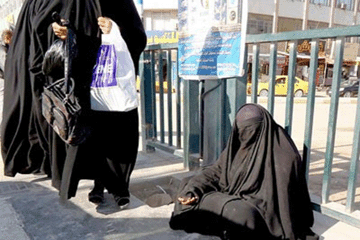- City Fajr Shuruq Duhr Asr Magrib Isha
- Dubai 04:33 05:50 12:21 15:48 18:46 20:03

As the first day of the holy month of Ramadan approaches, Dubai Police is already cracking down with its annual anti-begging campaign.
Under the ‘Battle Begging’ banner, a social media campaign is also encouraging community members to report such scams with a comprehensive awareness programme that will continue after Eid Al Fitr.

Major General Khamis Mattar Al Mazeina, Dubai Police Chief, said in a statement that begging to gain the sympathy of people during religious occasions and holidays is a criminal offence.

A toll free number (800243) has also been set up for the public to report any incidences.
The annual campaign has picked up momentum after several high profile cases of begging were reported over the years, with 2013 seeing a beggar from Naif in Deira arrested with over Dh90,000 in his possession.
A report in an Indian daily last year revealed that scores of that country’s beggars take flights into the emirate with a 45-day visit visa to beg for alms in Dubai, and use Ramadan as a business opportunity to make a quick buck.
With a week for the holy month to commence, several residents tell Emirates 24|7 some of the top scams they have encountered over the years.
Woman and her sick child
There have been reports of people being approached in parking lots of residential communities in Bur Dubai and Deira in the past, especially singling out middle-aged women to possibly make an emotional connect with mothers.
Jyothi Das, a Bur Dubai resident said: “It has happened with me twice in the last one year, once around Ramadan. On both occasions, a woman in a burkha approached me with a sleeping child in her arms appealing for money to treat him – once was a kidney issue the other was a blood disorder.”
Das said that the first time she felt sympathetic and handed over money, but after hearing reports of such scams around Ramadan, the second incident had her respond differently.
She said: “When it happened a second time, I told the lady, my husband is a doctor. Why don’t you come with me and he will treat your child for free. The beggar in turn lost her temper, snapped at me and walked away.
“People should report such incidences; for all you know, they probably even medicate those children to keep them sedated so they can ‘look sick for the part’.”
Petrol money
This is probably one of the oldest scams that residents of the UAE have witnessed: a family is travelling from a neighbouring GCC nation, they have run out of petrol and they need money to get them home and some food in the interim.
Naeem Khan, a Mirdiff resident, says: “If I had a Dh1 for every time I’ve been approached by some such family in dire straits... I have encountered such incidences throughout the year, but it does hit its peak during Ramadan.
“I have also noticed another pattern though – they almost always approach me when I am travelling with my wife and daughter. I think it’s a case of a woman will be more sympathetic to their cause.”
Anita Carlton, a resident of Dubai Marina, said: “I have heard about these scams on expat forums but I was surprised one evening when a large Cadillac Escalade stopped me one evening in the Dubai Media City car park, while I was walking towards my own car. It was a Saudi Arabia license plate, asking me for money so the gentleman could return home to his family.
“I wasn’t sure what to do, so I threatened to call the police and he just drove away. Even the beggars drive Dh200,000 cars!”
Money for Hajj
Similar to the petrol money scam, residents have reported of being approached in cars by families claiming they are unable to perform Hajj due to lack of funds.
Nadira Akhtar said: “I usually end up giving Dh15-20 in such cases in the hope that someone is genuine about his appeal and that I am helping someone perform his holy journey.”
Man with health problems
Over the years, several incidences of begging scams have included that of an injured man, with different states of physical or internal health issues have turned him to begging for money, usually right around Ramadan.
Residents have reported on Twitter of citing a man in Mirdiff last year, with an ‘official paper’ from what appeared to be a hospital in Pakistan that said he had cancer and he needed money to get himself treatment.
However, some beggars get creative when required.
Mohammed Al Qassim said: “Over the years I have seen a man bleeding, one with orange fluid taped to his chest, another walking on crutches with blood seeping through a bandage on his leg. During Ramadan, it is our duty to give Zakat and these people prey on that. The only way to stop this menace is to report to the police.”
House calls
Several Bur Dubai residents have reported unwelcome visitors right around the holy month, begging for money with “a sob story and a medical letter in hand,” said Kajal Govind.
She added: “I always, report such incidences, either to the watchman of our building or ask my husband to call the police. We have children at home, who go downstairs and play with the neighbourhood kids. None of the parents here want someone lurking around and soliciting.”
![]() Follow Emirates 24|7 on Google News.
Follow Emirates 24|7 on Google News.